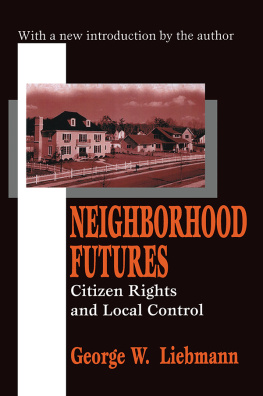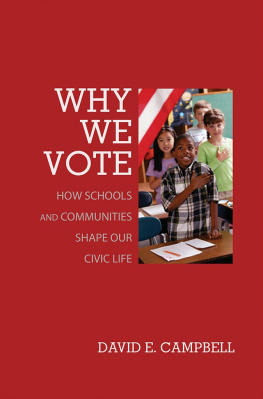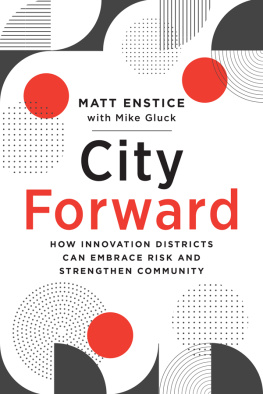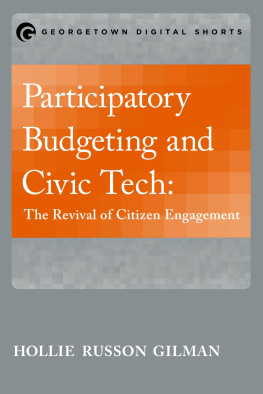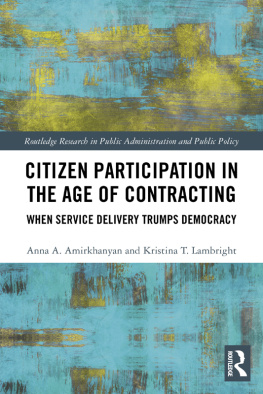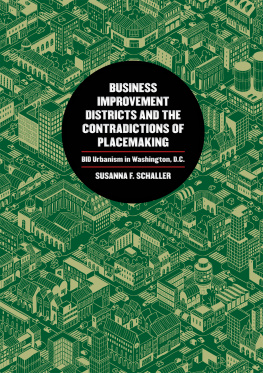Originally published in 2000 by Praeger
Published 2004 by Transaction Publishers
Published 2017 by Routledge
2 Park Square, Milton Park, Abingdon, Oxon 0X14 4RN
711 Third Avenue, New York, NY 10017, USA
Routledge is an imprint of the Taylor & Francis Group, an informa business
New material this edition copyright 2004 by Taylor & Francis
All rights reserved. No part of this book may be reprinted or reproduced or utilised in any form or by any electronic, mechanical, or other means, now known or hereafter invented, including photocopying and recording, or in any information storage or retrieval system, without permission in writing from the publishers.
Notice:
Product or corporate names may be trademarks or registered trademarks, and are used only for identification and explanation without intent to infringe.
Library of Congress Catalog Number: 2003059591
Library of Congress Cataloging-in-Publication Data
Liebmann, George W.
[Solving problems without large government]
Neighborhood futures : citizen rights and local control / George W.
Liebmann ; with a new introduction by the author.
p. cm.
Originally published: Solving problems without large government.
Westport, Conn.: Praeger, 2000.
ISBN 0-7658-0570-7 (pbk.: alk. paper)
1. Neighborhood government. 2. Citizensassociations. 3. Local government. 4. Political participation. I. Title.
JS211.L54 2004
323.042dc22
2003059591
Copyright Acknowledgments
Excerpts from Tax Policy in OECD Countries by K. Messere (Amsterdam: IBFD Publications, 1993) are reprinted by permission of IBFD Publications BV. Excerpts from Decentralist Trends in Western Democracies by L. Sharpe (London: Sage Publications, 1979) are reprinted by permission of Sage Publications, Inc. Excerpts from VAncien Rgime by A. de Tocqueville (Oxford: Blackwell Publishers, 1947) and The Greek State by V. Ehrenberg (Oxford: Blackwell Publishers, 1960) are reprinted by permission of Blackwell Publishers. Excerpts from Beyond Adversary Democracy by J. Mansbridge (New York: Basic Books, 1980) are reprinted by permission of Basic Books. Excerpts from The Public Choice Approach to Politics by Dennis C. Mueller (Cheltenham, UK: Edward Elgar Publishing Limited, 1993) are reprinted by permission of Edward Elgar Publishing Limited. Excerpts from The Calculus of Consent: Logical Foundations of Constitutional Democracy by J. Buchanan and G. Tullock (Ann Arbor: University of Michigan Press, 1962) are reprinted by permission. The University of Michigan Press.
ISBN 13: 978-0-7658-0570-6 (pbk)
The Bush administrations creation of an Office of Faith-Based and Community Initiatives gave hope to many of those concerned about the withering of civil society and the growth of ever-larger public and private bureaucracies. The more recent volunteerism initiative announced by the president has given many of these same people pause, however, over concerns that volunteerism will be replaced by government agencies and increasing bureaucracy. The successful encouragement of volunteerism by government in other countries provides a model for how the administration can combine its two major domestic initiatives.
The administration made a mistake by making well-publicized grants to particular religious organizations and by seeking to vary the charitable choice language in the 1996 welfare reform legislation. Legislative controversy was allowed to take the place of vigorous executive implementation. The best way to extend the concept of charitable choice to other areas of policy is to demonstrate its possibilities by vigorously implementing it in the areas where it is already authorized: with respect to welfare-related services and in the very general federal statute relating to appointment of probation officers. Similarly, instead of providing limited grants for the creation of charter schools, the president might have done better had he urged states to imitate the British Education Act of 1988 by making all schools charter schools, with their own self-governing boards.
If the new initiatives are to make a positive difference, they will have to generate new neighborhood secular institutions as well as explicitly faith-based ones. Local control will go a long way toward ensuring that nonprofit groups do not outrage the sensibilities of religious believers. The conflict between cultural cosmopolitans and fundamentalists is as old as the Republic and has traditionally been solved by allowing the contending factions local sovereignty in separate geographic spheres.
Courts, the press, and elective politicians have continued to engage in a thoughtless centralization of formal agencies of government. Tocqueville observed of the similar development set in train by the eighteenth-century French Economists, the Thatcherites of their time: They werevery favorable to the free exchange of commodities, to laissez-faire and laissez-passer in commerce and industry; but as to political liberties properly so-called, they did not dream of them. No grades in society, no classes distinct, no fixed ranks; a people composed of individuals almost alike and wholly equal, this confused mass recognized as the only legitimate sovereign, but carefully deprived of all the means which would enable it to direct or even to superintend its own government. This presaged the centralized tyranny produced by the French Revolution.
Prince Kropotkins criticism of fifteenth-century advocates has considerable relevance to the contemporary American bar, with its centralizing influence: Lawyers versed in the study of Roman law, flocked into [cities]. The very forms of the village community, unknown to their code, the very principles of federalism were repulsive to them as barbarian inheritances. Caesarism, supported by the fiction of popular consent and by the force of arms, was their ideal and they worked hard for those who promised to realize it.
However, there has also developed, under the politicians radar screen and in response to felt need, a whole new layer of sub-local institutions, public and private, in the real estate field, outside the cognizance of the social sciences. These include several hundred thousand residential community and condominium associations established by private deed covenants, governing about a quarter of the American population, with $100 billion in housing stock, $12.5 billion in expenditures, and $5 billion in reserves in 1987; property owner-based business improvement districts in nearly all major cities; historic preservation and special districts in many towns, not all of them old; an increasing number of neighborhood improvement districts in large cities; some street and block associations; and a handful of self-governing public schools. This hopeful development is just beginning; this book enumerates additional functions that can be assumed by sub-local instrumentalities.
This book seeks to build on the ideas in two earlier works. The first of these, The Little Platoons: Sub-Local Governments in Modern History (1995), reviewed the use made of small units in seven major countries and concluded with suggestions as to the future of such units in the United States. The second book,

